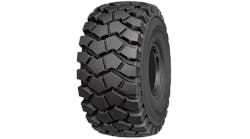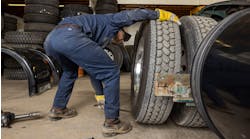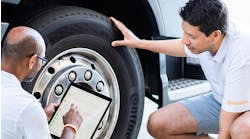One was imposed on consumer tire imports from China. The other soon may be imposed on passenger tires imported from Thailand. Not surprisingly, the United Steelworkers union supports both.
The topic is, of course, tariffs. They affect everyone in the tire distribution chain, but no one more than the end user, who ultimately pays the price — literally — for added costs incurred by tire manufacturers.
Last year, President Barack Obama increased the tariff on passenger and light truck tires imported from China from 4% to 39%. In September, it will be reduced to 34%, and in September 2011, it will drop to 29%.
The president can revisit the decision, which he based on a recommendation from the United States Trade Representative, on his own this month. However, given that Chinese tire imports represent less than 1% of all domestic Chinese import dollars, he has no reason to change his mind at this point.
[PAGEBREAK]
The World Trade Organization (WTO) also is looking into the dispute because China appealed the president’s decision. After the appeals process has been exhausted, a WTO decision becomes final when its Dispute Settlement Body (DSB) adopts it.
“The (dispute settlement) panel process, like the U.S. court process, can take some time,” says Nefeterius McPherson, senior media affairs liaison for the Office of the U.S. Trade Representative.
“It is up to the particular panel. An indicative time would be around nine months, but it could be longer.” An appeal usually takes approximately 90 days once launched, he adds.
What if a member-country of the WTO decides not to abide by the DSB ruling? According to McPherson, the WTO rules provide for a compliance process, “which generally permits the complaining party to impose trade sanctions on the non-complying responding party up to an amount equivalent to the level of trade damage.”
From 2004 to 2008, domestic consumer tire imports from China increased 215% to 46 million units, prompting the United Steel, Paper and Forestry, Rubber, Manufacturing, Energy, Allied Industrial and Service Workers International Union (USW) to file the initial protest that successfully led to the tariffs.
Thailand is the union’s next target. Under the U.S. government’s Generalized System of Preferences (GSP), a specified number of passenger tires from Thailand can come into our country duty-free. When that maximum is reached, a 4% tariff is applied.
Passenger and light truck tires from Thailand also have been on the rise for years. They increased 852% from 2004-2008. They also increased another 7.5% in 2009, no doubt in part because of the drop in Chinese imports. But the total number of units from Thailand — 3.7 million passenger tires and 600,000 light truck tires — hardly can be described as a market disruption.
Two companies, Bridgestone Americas Tire Operations LLC and Sumitomo Rubber Industries Ltd. (through its Thailand subsidiary), have petitioned the GSP Subcommittee to grant them waivers of “the competitive need limit” for passenger tire imports from Thailand.
[PAGEBREAK]
Bridgestone claims the addition of the 4% tariff likely would compel it to “reconsider its global sourcing patterns for the U.S. market, including a possible shift to other source countries.” In addition, terminating GSP benefits for Thai-origin radial passenger tires also would serve “to penalize the Thai industry for U.S. market conditions that it did not create.” Sumitomo Rubber (Thailand) Co. Ltd. makes the same claims.
The USW is contesting the exemptions with the same vigor that it supported the tariffs on Chinese tire imports.
“We certainly did not bring that petition so that companies could then seek waivers under the GSP system to avoid the special safeguard remedy and undermine its effect,” wrote Linda Andros, the union’s legislative council, in her remarks to the subcommittee.
The union says the 4% tariff will amount to only $1.76 per tire in additional costs.
Bridgestone says the dramatic decline in consumer imports from China already has led to price increases on passenger tires in the U.S. “These price increases likely raised import values for supplier countries other than China to levels higher than they otherwise would have reached.” (Bridgestone took a neutral position on the Chinese tire tariff petition by the USW.)
Under federal law, the president can grant or deny requested competitive need limits. So this decision, too, is up to him.
Hopefully, he will not make the same mistake he initially made with Chinese imports. One of these days, he is going to side with the consumer. ■
If you have any questions or comments, please e-mail me at [email protected].




